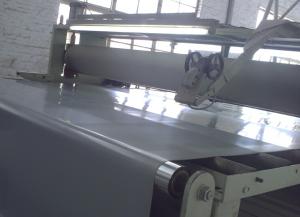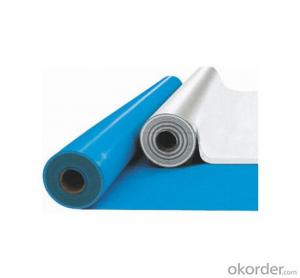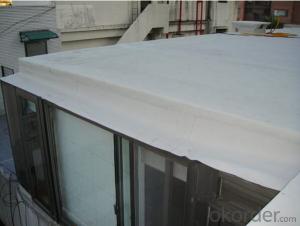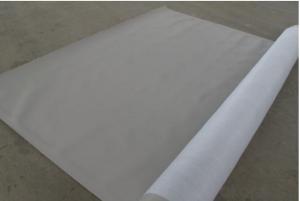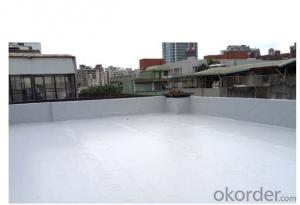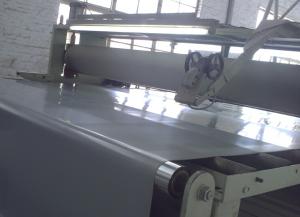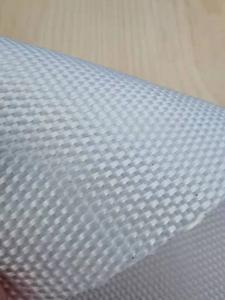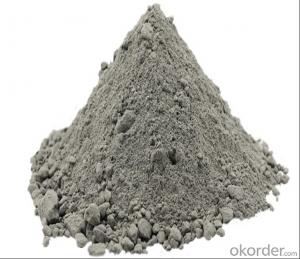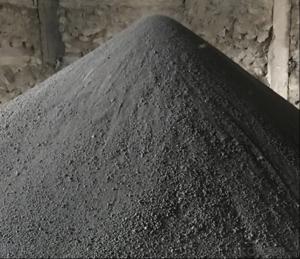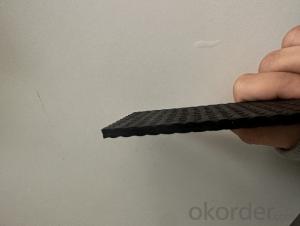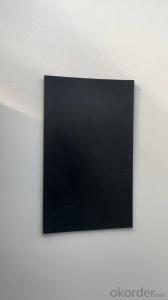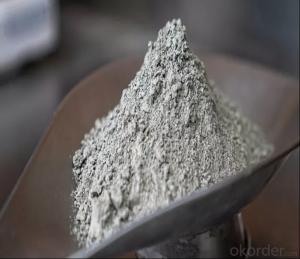PVC Roofing and Waterproofing Plastic Membrane
- Loading Port:
- Qingdao
- Payment Terms:
- TT or LC
- Min Order Qty:
- 3000 m²
- Supply Capability:
- 300000 m²/month
OKorder Service Pledge
OKorder Financial Service
You Might Also Like
Introduction of PVC Waterproof Membrane
PVC waterproofing roofing membrane are based upon Polyvinyl Chloride Resin with other additives to provide flexibility and stability. It gives a good performance of anti-oxidant, absorbent of ultraviolet light, plasticizer, anti-UV agent, anti-aging with other additives to provide flexibility and stability. It gives a good performance of anti-oxidant, absorbent of ultraviolet light, plasticizer and plastic filling agent.
It is an excellent high quality polymer waterproof sheet, made of PVC resin by adding plasticizer, anti-UV agent, anti-aging agent, and stabilizer and other processing aids through extrusion and molding.
As the highly recommended product by the Ministry of Consturction, it is featured by high tensile strength, great elongation, good stability, small shrinkage, low temperature performances, good resistance to weathering and root penetration and long service life.
.
Features of PVC Waterproof Membrane
1)Excellent aging resistance. Service life of roofing material is over 20 years; service life of underground material is over 50 years.
2)Root resistant penetration, specially used on planting roofings.
3)Welding installation. Joints are solid and environment friendly, no pollution.
4)High tensile strength, good elongation and dimensional stability.
5)Good plasticity, easy and suitable for details installation.
6)Fireproof. Fire extinguished out of the ignition resource.
7)Surface is smooth, no fading and dirty resistant.
8)Width is over 2m. Construction wastage is small, more economical.
Classification and Specification of PVC Waterproof Membrane
N: Homogeneous PVC membrane
L: PVC membrane with fabric backing
W: Reinforced PVC membrane
Thickness: 1.2mm/1.5mm/2.0mm
Size: 2.05mx20m
Color: white/grey, or any other colors.
Advantage of PVC Waterproof Membrane
1.) Mixing automation. Apply automatic temperature control automatic time control and automatic feed control.
2.) Extrusion equipment uses twin screw coextrusion. Screw temperature uses computer automatic temperature control system.
3.) Handpiece uses large width didhead extrusion equipment.
4.) Sophisticated three-roller calender equipment. The space between equiment is controlled by automation system.
Application of PVC Waterproof Membrane
PVC membrane applies special formula and its service life is much longer than other general waterproof membranes. Its excellent performance makes it be widely used in every field.
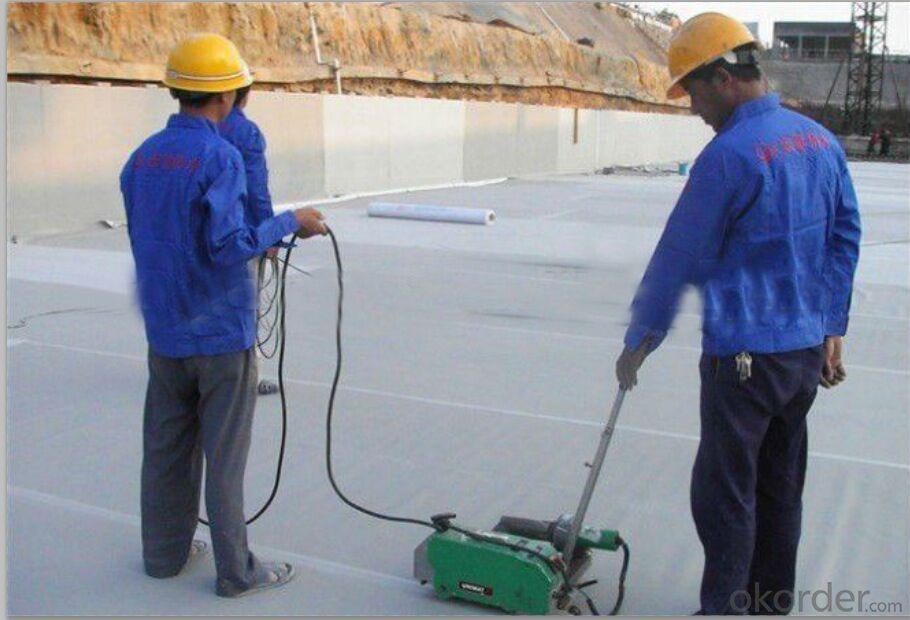
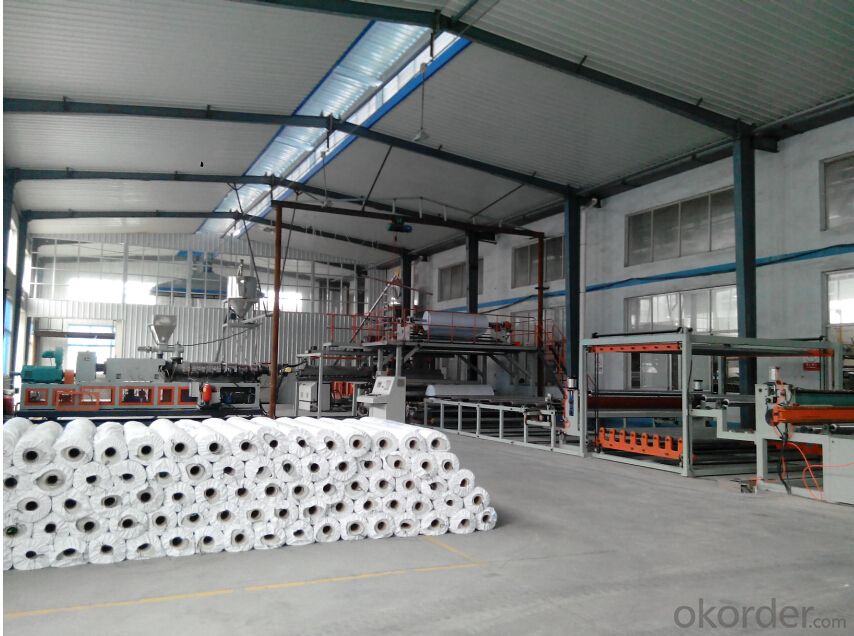
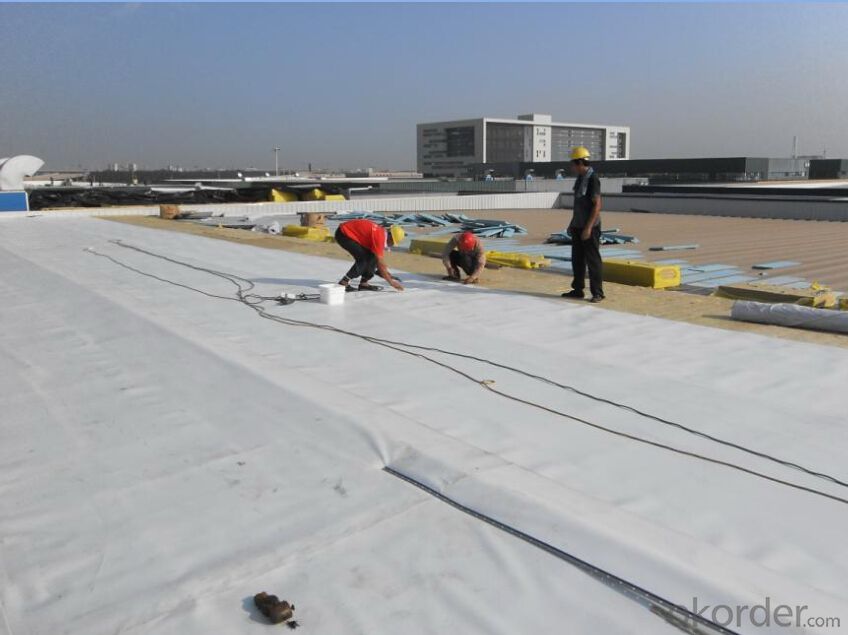
FAQ:
Can you produce 4m width?
Yes, no problem for us. We have four bases in China, largest one in this field.
How many quantity in one 20'' container for 1.2mm and 1.5mm?
480rolls, 11520m2 for 1.2mm and 400rolls, 9600m2 for 1.5mm
Can you provide free samples?
Yes, our samples are free, but express fees usually on buyer's account.
- Q:Can waterproofing membranes be used on utility vaults?
- Yes, waterproofing membranes can be used on utility vaults. They provide an effective barrier against water intrusion, protecting the vault and its contents from moisture damage. Waterproofing membranes help to maintain the structural integrity of the vault and ensure its long-term functionality.
- Q:Can a waterproofing membrane be used in conjunction with roofing materials?
- Using a waterproofing membrane alongside roofing materials is a common practice. It is often applied directly on top of the roofing material to provide extra protection against water infiltration. This is particularly helpful in regions with heavy rainfall or where the roof is exposed to excessive moisture. The waterproofing membrane not only prevents leaks and prolongs the roof's lifespan, but it also safeguards the structure from potential water harm. Furthermore, it offers insulation and energy efficiency advantages. All in all, incorporating a waterproofing membrane with roofing materials is a prudent decision to enhance the roof's durability and waterproofing abilities.
- Q:Can a waterproofing membrane be used in conjunction with other waterproofing products?
- Yes, a waterproofing membrane can be used in conjunction with other waterproofing products. In fact, it is common practice to use multiple waterproofing methods together to provide enhanced protection against water damage. For example, a waterproofing membrane can be used as a primary waterproofing layer, and then complemented with other products such as sealants, coatings, or drainage systems for added durability and performance. The combination of these products can help create a more robust and comprehensive waterproofing system, ensuring maximum protection against water intrusion and preventing potential leaks or moisture-related issues.
- Q:Can a waterproofing membrane be used on asphalt roofs?
- Yes, a waterproofing membrane can be used on asphalt roofs. In fact, it is a common practice to apply a waterproofing membrane on asphalt roofs to enhance their durability and protect them from water damage. The membrane is typically made of a synthetic material, such as modified bitumen or EPDM, which creates a barrier against water infiltration. This helps prevent leaks and extends the lifespan of the asphalt roof. Additionally, the waterproofing membrane can also provide added insulation and energy efficiency benefits to the building. However, it is important to ensure that the specific waterproofing membrane chosen is compatible with asphalt and meets the necessary industry standards for performance and durability. Consulting with a professional roofing contractor or manufacturer is recommended to determine the most suitable waterproofing membrane for asphalt roofs.
- Q:Can a waterproofing membrane be used on precast gypsum surfaces?
- Precast gypsum surfaces, commonly utilized in construction for various building components like walls and ceilings, can benefit from the application of a waterproofing membrane. Without proper protection, these porous surfaces are susceptible to water damage. To safeguard precast gypsum, a waterproofing membrane serves as a barrier, preventing water infiltration. By creating a protective layer, it halts the seepage of water into the gypsum, thereby averting issues such as mold growth and deterioration. Multiple types of waterproofing membranes are available in the market, including liquid-applied membranes, sheet membranes, and cementitious coatings. These versatile options can adhere effectively to precast gypsum and other surface materials. When employing a waterproofing membrane on precast gypsum, it is vital to ensure the surface is devoid of any contaminants that could hinder the membrane's adhesion. The application process should adhere to the manufacturer's instructions, taking into account factors like temperature, humidity, and drying time. In summary, the application of a waterproofing membrane on precast gypsum surfaces is indeed possible and highly recommended for protection against water damage. Selecting the appropriate membrane type and following proper application techniques are crucial for optimal efficacy.
- Q:Can a waterproofing membrane be used on precast stone block surfaces?
- Precast stone block surfaces can benefit from the application of a waterproofing membrane. These membranes are frequently utilized to safeguard a variety of surfaces, including precast stone blocks, from water infiltration and moisture harm. The purpose of these membranes is to establish a barrier that prevents water from seeping into the surface and causing problems like mold, decay, or structural deterioration. By applying a waterproofing membrane to precast stone block surfaces, their durability and lifespan can be improved by shielding them from water-related difficulties. However, it is crucial to diligently adhere to the manufacturer's instructions and ensure that the chosen waterproofing membrane is appropriate for the specific type of precast stone block surface being treated.
- Q:Are there any specific installation requirements for waterproofing membranes?
- Yes, there are specific installation requirements for waterproofing membranes. These requirements may vary depending on the type of membrane being used, but common requirements include proper surface preparation, application of a primer if necessary, ensuring the membrane is correctly positioned and stretched, and using the appropriate adhesive or sealant for bonding. It is essential to follow the manufacturer's guidelines and recommendations to ensure proper installation and the effectiveness of the waterproofing membrane.
- Q:Can a waterproofing membrane be used for an underground structure?
- Yes, a waterproofing membrane can be used for an underground structure. A waterproofing membrane is a protective layer that is designed to prevent the penetration of water into a structure. It is commonly used on roofs, basements, and other areas that are prone to water infiltration. When used in an underground structure, such as a basement or foundation, a waterproofing membrane serves as a barrier against water that may be present in the surrounding soil or groundwater. It helps to prevent water seepage, which can cause damage to the structure and lead to issues such as mold growth or structural deterioration. The waterproofing membrane is typically applied to the exterior walls and the foundation of the underground structure to provide a watertight seal. It is important to select a high-quality membrane that is specifically designed for underground use and meets the necessary industry standards. Additionally, proper installation techniques, including surface preparation and sealing of seams, are crucial to ensure the effectiveness of the waterproofing membrane in an underground structure.
- Q:Are waterproofing membranes resistant to mineral oils?
- The resistance of waterproofing membranes to mineral oils can differ. Certain membranes are purposely engineered to withstand mineral oils, while others may not possess this capability. To ascertain the resistance level of a specific waterproofing membrane to mineral oils, it is crucial to review the manufacturer's specifications and product details. Moreover, seeking advice from a professional or directly contacting the manufacturer is advised to obtain tailored guidance regarding the compatibility of a waterproofing membrane with mineral oils in your unique scenario.
- Q:Can a waterproofing membrane be used on brass surfaces?
- To safeguard surfaces from water infiltration and harm, one usually employs a waterproofing membrane. Despite brass surfaces not being particularly susceptible to water damage, an additional safeguarding layer can still be applied in the form of a waterproofing membrane. This can aid in the prevention of moisture accumulation on the brass surface, ultimately averting tarnishing or corrosion. Nonetheless, it is crucial to acknowledge that brass surfaces are often sought after for their innate patina and aesthetic allure. The application of a waterproofing membrane may alter the brass's appearance, potentially resulting in a glossy or artificial finish. Thus, it is prudent to thoroughly ponder the desired outcome prior to opting for the utilization of a waterproofing membrane on brass surfaces.
1. Manufacturer Overview |
|
|---|---|
| Location | |
| Year Established | |
| Annual Output Value | |
| Main Markets | |
| Company Certifications | |
2. Manufacturer Certificates |
|
|---|---|
| a) Certification Name | |
| Range | |
| Reference | |
| Validity Period | |
3. Manufacturer Capability |
|
|---|---|
| a)Trade Capacity | |
| Nearest Port | |
| Export Percentage | |
| No.of Employees in Trade Department | |
| Language Spoken: | |
| b)Factory Information | |
| Factory Size: | |
| No. of Production Lines | |
| Contract Manufacturing | |
| Product Price Range | |
Send your message to us
PVC Roofing and Waterproofing Plastic Membrane
- Loading Port:
- Qingdao
- Payment Terms:
- TT or LC
- Min Order Qty:
- 3000 m²
- Supply Capability:
- 300000 m²/month
OKorder Service Pledge
OKorder Financial Service
Similar products
New products
Hot products
Hot Searches
Related keywords
